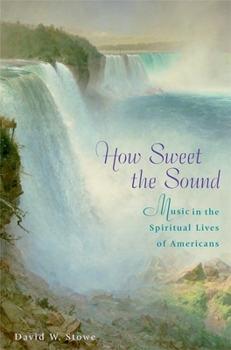How Sweet the Sound: Music in the Spiritual Lives of Americans
Select Format
Select Condition 
Book Overview
Musical expression is at the heart of the American spiritual experience. And nowhere can you gauge the depth of spiritual belief and practice more than through the music that fills America's houses of worship. Most amazing is how sacred music has been shaped by the exchanges of diverse peoples over time. How Sweet the Sound traces the evolution of sacred music from colonial times to the present, from the Puritans to Sun Ra, and shows how...
Format:Hardcover
Language:English
ISBN:0674012909
ISBN13:9780674012905
Release Date:April 2004
Publisher:Harvard University Press
Length:335 Pages
Weight:1.57 lbs.
Dimensions:1.3" x 6.4" x 9.3"
Customer Reviews
2 ratings
An excellent work - An expanding provocative area of study
Published by Thriftbooks.com User , 20 years ago
First a note of disclosure: As I write this, I am one of David's graduate students at Michigan State University. And thankfully, because of this, David has allowed me to suggest pre-publication comments and and in some small way perhaps add to the fine scholarship of this project. In "How Sweet the Sound," David Stowe points out that music plays a "variety of roles in religious life." Socially, its a means of transmitting behavioral and belief codes. Phenomenologically, it serves as a channel for means of ecstatic communication through the infusion of power, or as a means for liturgical address and response. Additionally, sacred music accumulates additional meanings over time, layered and even disjunctive in content. These accumulations often occur for invountary as well as voluntary reasons, as music bears the markers of community exclusion, exile, and conquest. In sociological terms, music is part and parcel of creation and maintenance of a religious "habitus." But this always occurs in a broader web of contexts--economic, political, and othewise. Stowe's approach is to draw broad, yet circumscribed historical contours by examining prominent case studies. His approach is deliberately and commandingly pluralistic, a pluralism extending both within and beyond Christianity. Yet his larger point is that even at its most radically pluralistic and sectarian, stories and narratives from the Hebrew Bible have become and maintained their predominant place in American religious music, and by extension, American religious life. The story of Exodus, in many ways, is the story of Mormons, Shakers, African-Americans, 19th century Esotericists, and Sun Ra's "Afro-Futurism." Along the way, we see clear trends delineated--such as a tradition of strongly bodily affective religious music in the United States. This should be no surprise, given the primacy of the Hebrew Bible as a source for allegory, metaphor and narrative in Christian religious music. The Biblical Song of Solomon is especially strong in its use of eroticism as religious devotion. Likewise, Moravian hymms have been characterized as "impassioned, full of vivid imagery of Christ's atoning blood and a nearly erotic emphasis on communion with Christ." Methodist hymns, especially those influenced by John Wesley, were in many ways a reaction against this tendency. In a more general sense, neither of the Wesleys could stop the development of American Shaker hymns. Though not erotic in nature, Shaker hymns were certainly affective. Producing visions of ecstasy and celestial kingdoms, and "divine communication," they danced in the set of affective relationships that has been part of the Christian tradition, especially its mystical subtraditions, since its earliest days. Even in the political and religious mainstream of music in the 18th and 19th century United States, William Billings' patriotic hymms produced "inchanting" and "ecstatic" erotic songs. Together with both Methodist austerity and imp
Mel Gibson should make a movie about this book
Published by Thriftbooks.com User , 20 years ago
Stowe writes with 'Passion' about his subject. Look for Mel Gibson to make a movie about it.





